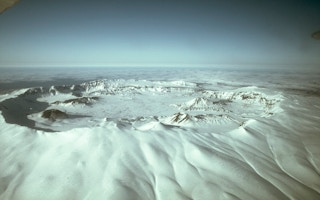Once again, geologists have shown that climate change can be linked to some of the most dramatic moments in human history: civil strife in the Roman Republic that ended with the fall of a Greek dynasty in Egypt and the rise of the Roman Empire.
The summers just after the assassination of Julius Caesar in 44 BCE (Before the Christian Era) were among the coldest in the northern hemisphere for thousands of years, and this sudden prolonged chill can be linked to lost harvests, famine, the failure of the all-important Nile flood and the death of the Roman Mark Antony and the last of Egypt’s Ptolemaic rulers, Cleopatra.
The trigger for that cold shadow over the Mediterranean theatre of history? Summer and autumn temperatures fell to as much as 7°C below normal because on the far side of the hemisphere an Alaskan volcano erupted in 43 BCE to hurl colossal quantities of soot and sulphates into the stratosphere and dim the sun’s radiation for much of the next decade.
And the evidence? Deposits of volcanic ash in the Arctic ice cores that can be linked directly to one once-smoking crater in the Aleutian islands now known as Okmok, according to new research in the Proceedings of the National Academy of Sciences.
Average temperatures fell dramatically. Summer rainfall in southern Europe rose by 50 per cent to 120 per cent above normal. Autumn rainfall rose fourfold.
The rest is history: literally. Roman and Chinese chronicles surviving from that time record what scientists call “unusual atmospheric phenomena” as well as “widespread famine.”
Less directly, records of lead pollution preserved in the annual layers of ice in Greenland tell a story of economic decline, reflected in what might be the reduction of mining and smelting of lead and silver during the last years of the Roman Republic.
And the effect on the hemisphere’s climate was also recorded in the annual flow and flood of the River Nile, a regular inundation that enriched the grain harvest of the Nile Valley, and supplied bread for Rome and its sister cities.
The research was led by Joe McConnell of the US Desert Research Institute in Nevada. “To find a volcano on the other side of the Earth erupted and effectively contributed to the demise of the Romans and the Egyptians and the rise of the Roman Empire is fascinating,” he said. “It certainly shows how interconnected the world was even 2000 years ago.”
And one of his co-authors, Joseph Manning of Yale University, said: “We know that the Nile River did not flood in 43 BCE and 42 BCE – and now we know why. The volcanic eruption greatly affected the Nile watershed.”
Climate’s role
That mass migration, conflict and the collapse of once-stable regimes can be linked to climate change is not news: researchers have repeatedly found that drought, cold and harvest failure can be matched with the collapse of ancient empires in the Middle East and in the Bronze Age Mediterranean.
Just 1500 years ago volcanic eruptions have been timed to the famine, the Plague of Justinian, and other turmoil in the Byzantine empire. Professor Manning had already linked a failure of the Nile flood to the collapse of the Ptolemaic dynasty in Egypt.
Neither the volcanic eruption nor the consequent climate disruption can be said to have “caused” ancient power struggles. But a backdrop of instability, hunger and famine can be linked to conflict, and climate is now seen as an inseparable factor. Cold, heavy rain at the wrong season can ruin any harvest.
“In the Mediterranean region, these wet and extremely cold conditions during the agriculturally important spring through autumn seasons probably reduced crop yields and compounded supply problems during the ongoing political upheavals of the period,” said Andrew Wilson of the University of Oxford, another author.
“These findings lend credibility to reports of cold, famine, food shortage and disease described by ancient sources.”
This story was published with permission from Climate News Network.

















